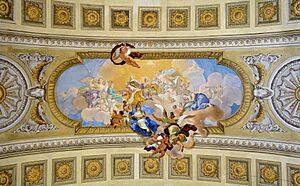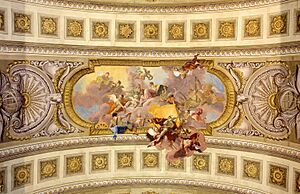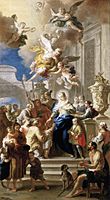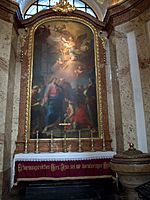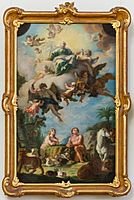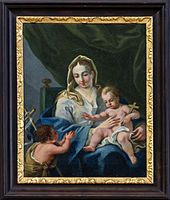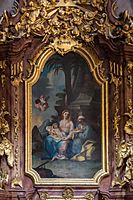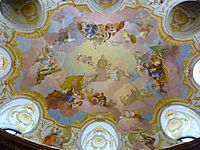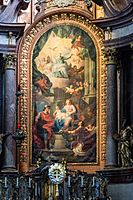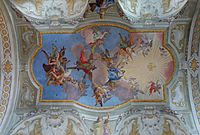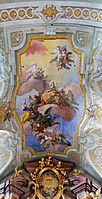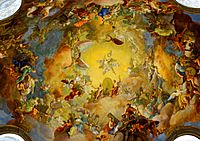Daniel Gran facts for kids
Quick facts for kids
Daniel Gran
|
|
|---|---|
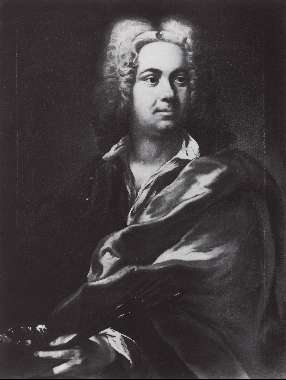 |
|
| Born | 22 May 1694 |
| Died | 16 April 1757 (aged 62) |
| Nationality | Austrian |
| Education | Sebastiano Ricci (Venice, Italy) and Francesco Solimena (Naples, Italy) |
| Known for | Painting |
|
Notable work
|
St Anna's Church's frescoes (Vienna), Österreichische Nationalbibliothek Prunksaal's frescoes |
| Movement | Baroque |
Daniel Gran was an Austrian painter born in Vienna on May 22, 1694. He passed away in Sankt Pölten on April 16, 1757. Gran was famous for his beautiful paintings that decorated many public buildings in his home city. He was considered a very important artist in his time. He was one of the first major painters from German-speaking countries after a long period when Italian artists were most popular. Today, his art is mostly known in Austria and Germany.
Life and Training
Daniel Gran was one of the sons of the chef to Emperor Leopold I. A rich family called the House of Schwarzenberg helped Daniel Gran. They paid for his art studies and trips to Italy. In Italy, he learned from famous painters like Sebastiano Ricci in Venice and Francesco Solimena in Naples.
Gran's paintings show influences from both places. His use of colors was inspired by Venice, and his way of arranging scenes came from Naples. Besides the Schwarzenberg family, he also painted for the House of Habsburg, another powerful family. In 1727, he was chosen to be their official court painter.
From 1732, Daniel Gran started using the name "Daniel le Grand." Later, in 1736, he added "della Torre" to his name. This made it sound like he came from a noble family. Near the end of his life, Gran's paintings began to change. They looked less like the dramatic "Baroque" style. Instead, they started to show simpler, more balanced forms. This style is known as "classicism." Because of this, Gran is seen as an important artist who helped lead the way to the classicism art movement.
In 1894, a street in Vienna was named Grangasse in his honor.
Famous Works
Daniel Gran created many amazing artworks, especially large paintings on ceilings and walls called frescoes, and paintings for church altars.
Frescoes
- Palais Schwarzenberg in Vienna
- The grand hall (Prunksaal) of the Österreichische Nationalbibliothek (Austrian National Library) in Vienna
- Eckartsau castle
- Pilgrimage church Sonntagberg
- Cathedral in Sankt Pölten
- Emperor's Hall (Kaisersaal) in Stift Klosterneuburg
- New Town Hall (Neues Rathaus) and Landhaussaal in Brno
Altar Paintings
- Churches in the Stift Herzogenburg and Stift Lilienfeld
- Parish Church of Hirschstetten
- Cathedral in Sankt Pölten
- St Anna's church in Vienna
He also painted a self-portrait, which can be found in the monastery of Herzogenburg.
Gallery
See also
 In Spanish: Daniel Gran para niños
In Spanish: Daniel Gran para niños
 | Kyle Baker |
 | Joseph Yoakum |
 | Laura Wheeler Waring |
 | Henry Ossawa Tanner |


